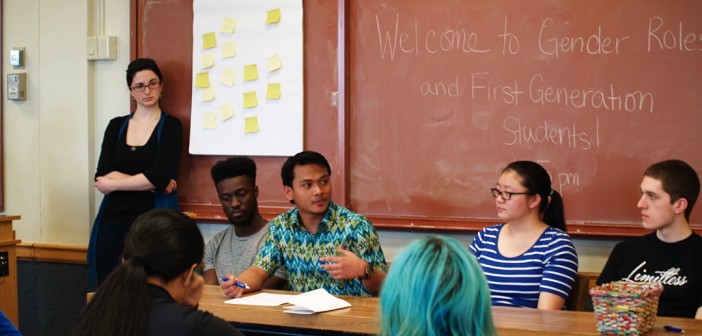Of the various factors that influence a first-generation student’s experiences, those that can have a particular impact are gender roles, customs and expectations — a notion addressed by the Women’s Center at a Gender Roles and First-Generation Students panel March 22.
The discussion panel consisted of several undergraduate students who spoke about their experiences as first-generation students on Lehigh’s campus and detailed how their expectations differed from those of other students.
Sarah Heidenbrink-Bruno, a first year doctoral English student and a graduate assistant at the Women’s Center, said first-generation students are often unfamiliar with the expectations of college life. The Lehigh Summer Scholars Institute is a program offered to first-year students the summer before their initial semester to help them transition into college life.
The Women’s Center event took a different approach from the summer program, and focused on the social and gendered aspects of being a first-generation student.
“They are the first in their family to attend a college orientation, meet with a professor, live among such diversity and so (on) and so forth,” Tyrone Russell, the director of the Summer Scholars Institute, wrote in an email. “In short, there are a lot of growing pains when you are paving the way compared to those who have been forewarned, growing up in households where ‘college talk/culture’ was part of growing up. Sometimes, being the first can be intimidating as this world is very new and uncharted.”
Lori McClaind, the assistant dean of academic transitions, said approximately 10 percent of Lehigh students are first-gens. This number is low compared to statistics from a 2010 study by the Department of Education, which shows that an estimated 50 percent of the overall college population consists of first-gens.
Numbers may vary because of the variety of ways schools define a first-generation student. Bruce Bunnick, the director of admissions, wrote in an email that the admissions office identifies students as first generation if neither parent attended and graduated from a 2- or 4-year college. He also wrote the office noticed an increase in first-generation student applicants, although they have only started intentionally tracking data in the past five to seven years.
Jennifer Mertz, the director of Financial Aid, said the office uses data from the Common Application to have targeted phone-a-thons for first-generation students to aid them in the financial aid application process. She also said the office is looking into potential future programs to target first-generation students.
Heidenbrink-Bruno developed and facilitated the event at the Women’s Center because she was a first-generation student at Albright College and felt there should be discussion about the topic.
“There’s very much a culture of silence, you kind of knew you were a first-generation student and maybe you told your friends about it,” Heidenbrink-Bruno said. “But we didn’t have special programs or seminars to talk about the issues that would come up as a first-generation student.”
She said first-generation students may sometimes feel pressure from their families to succeed.
Heidenbrink-Bruno also noted how many of the panelists were told their only focus should be school, and most of them were warned to avoid distractions like serious dating and the social scene.
“Some of it is also based on expectations that daughters and sons will grow up and take care of the family, so that is part of their gendered experience or expectations that their parents or families are giving to them,” Heidenbrink-Bruno said.
Jeddah Cousar, ’19, former Lehigh Summer Scholars Institute participant, has a different mindset to being a first-generation student. She said her experience was initially challenging but rewarding because she has the opportunity to be independent but still share her experiences with her family.
“I can see why people feel like an outsider, but I personally don’t,” Cousar said. “I think it’s rewarding. My mom wanted me to come here and be open to every opportunity. Where I’m from, a lot of people don’t go to college, but people appreciate any type of college experience, whether you want to go for yourself or for your family.”






Comment policy
Comments posted to The Brown and White website are reviewed by a moderator before being approved. Incendiary speech or harassing language, including comments targeted at individuals, may be deemed unacceptable and not published. Spam and other soliciting will also be declined.
The Brown and White also reserves the right to not publish entirely anonymous comments.